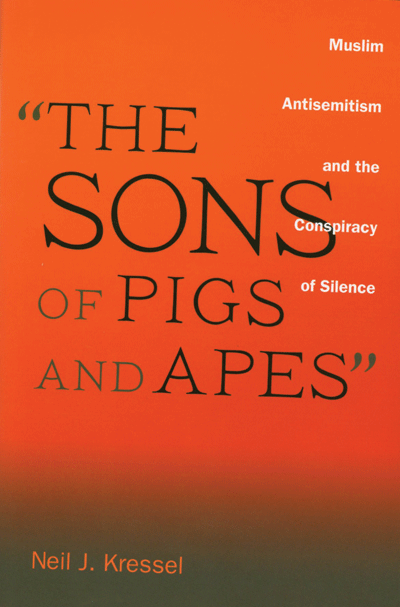Reviewed by NEAL GENDLER
Neil Kressel’s Sons of Pigs and Apes is too important to deserve the fate of many worthy books these days: small printing, minimal promotion and disappearance.
Pigs is necessary reading for those who don’t grasp the depth of Muslim animosity toward Jews and Israel, and for those who think that a solution to the Arab-Israel problem is just a matter of agreeing about lines on a map.
“This book is about dangerous, old-fashioned Jew-hatred spreading like wildfire through large parts of the Muslim and Arab world,” says Kressel, a doctor of social psychology who directs the social sciences honors program at William Paterson University. “More importantly, it is about what the failure to address this exploding hostility means for everyone who cares about progressive values and the future of Western civilization.”
Kressel doesn’t beat up on Islam or Muslims. He says clearly and often that anti-Muslim hatred, so-called Islamophobia, must be opposed. He formerly was a visiting professor at the now-defunct Yale Initiative for the Interdisciplinary Study of Antisemitism, and his objective is “to combat a dangerous bigotry so that Muslim-Jewish relations may develop on a firm and lasting foundation of truth and good will.”

Fat chance, if the trends Kressel cites continue. While “Jew-hatred has roots in the long history and complex theology of Islam,” he says, the Islamic tradition also “might be used to sustain a liberal and tolerant mind-set.” But the obverse is gaining, with Islamic Jew-haters not only drawing from their own historic resources but importing European anti-Semitic slanders and caricatures, many straight from Nazi and Soviet propaganda.
This hatred is dangerous for the United States because it often mixes with anti-Americanism, with the United States “seen as a tool of the Jews or in the hands of Jewish money.”
But even with the annihilationist pronouncements of Iran, “much of the liberal world seems content to ignore anti-Jewish bigotry among Muslims and Arabs, or at least to explain it away.” Failure to engage this problem is, he says, at least a “blind spot in the contemporary anti-racist community” and, at worst, “a serious indictment.”
Kressel says that Muslim Jew-hatred is not solely a result of the Arab-Israeli dispute and is “an acid test of the seriousness of Western liberalism,” with Jews as the perennial “canary in the coal mine” of very bad things to come. While most in the West “are quite ready to denounce Jew-hatred when it comes from Nazis and other long-dead antisemites,” there is a “deep resistance” to speaking out against the same hatred from Arabs and Muslims.
That resistance, he says, makes its practitioners complicit in the hatred and its consequences.
Those are the themes, set in early pages, and he develops them well. His second chapter, “Evidence,” provides a plethora of examples of Muslim Jew-hatred predating and going far beyond the Arab-Israeli conflict. Chapter 3, titled “The Shame of the Anti-racist Community,” shows how many of those who oppose almost every “ism” ignore expressions of Jew-hatred they’d not tolerate about any other group.
Other chapter names also clearly identify their contents, which are presented factually and without inflammatory language by Kressel. Perhaps the best is “The Flawed Logic of Antisemitism Minimization,” with minimizers claiming that “most Muslim and Arab negativity toward Jews is not really bigotry, or even if it is, it does not merit much attention or concern.”
Kressel says that “minimizers and deniers of Muslim antisemitism now dominate debates in the Western intellectual establishment.” That’s frightening, especially with Iran’s Hitlerian exterminationist proclamations.
“Ancient Roots, Modern Roots” shows that Muslim Jew-hatred has deeper roots than the creation or behavior of Israel. If Jews usually lived peacefully under Muslim rule, it was as dhimmi, a second-class status often also given to Christians. Consequently, many Muslims feel deep dissonance over Jewish sovereignty and strength in the sliver of land once ruled by Islam.
“Fighting Back against Bigotry” features Muslims who, atypically, speak out against anti-Semitism. Kressel offers no quick, easy solutions, but he argues the beginning is for individuals, governments and the Israel-fixated United Nations to start living up to their professed ideals.
***
Neal Gendler is a Minneapolis writer and editor.
(American Jewish World, 1.18.13)




















